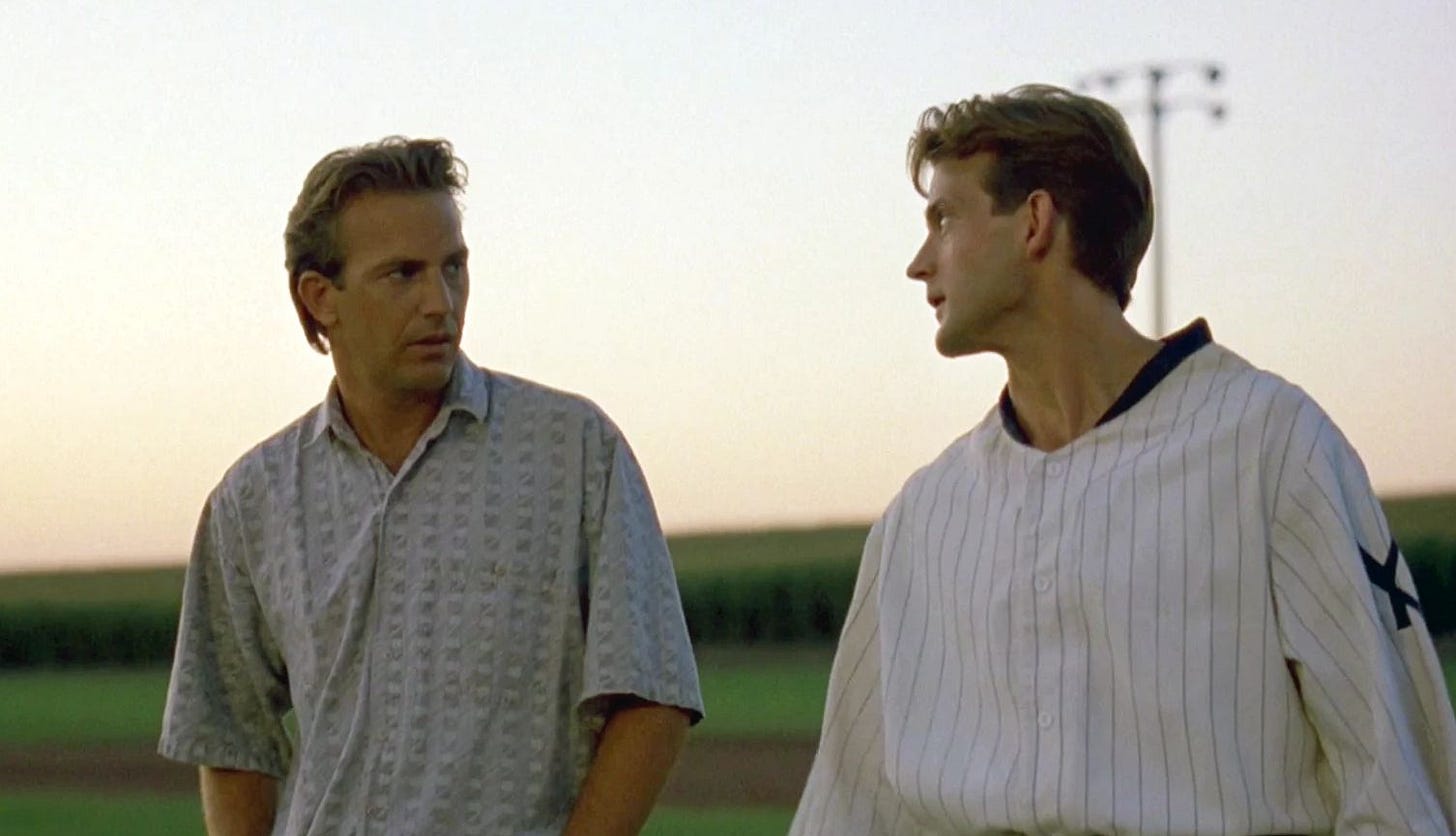100 Movies Every Catholic Should See #83: Field of Dreams (1989)
Written & Directed by Phil Alden Robinson. Starring Kevin Costner, Amy Madigan, James Earl Jones, and Ray Liotta
The one constant through all the years Ray, has been baseball. America has rolled by like an army of steamrollers. It’s been erased like a blackboard, rebuilt, and erased again. But baseball has marked the time. This field, this game, is a part of our past, Ray. It reminds us of all that once was good, and that could be again.
Sports movies just work. They’re exciting. They’re inspiring. They’re heartbreaking. They’re all of these things — when done right.
We’re all familiar with at least one. Hoosiers. Rocky. Rudy. Remember the Titans. Moneyball. Every year, the studio system rolls out a new one that hits all the same, comfortable beats. The underdog rises, obstacles are overcome, and the audience walks away with that good old-fashioned belief in the power of the human spirit.
Field of Dreams is about all that, yes. But just calling it a “sports movie” feels incomplete. Yes, it literally is all revolving around baseball. But sports movies — outside of Angels in the Outfield — don’t usually have a supernatural bent to them. Field of Dreams is willing to take that risk.
It’s willing to lean into sentimentality — some might call it corniness, if that’s you, feel free to sit this one out — to tell a timeless story about belief.
Belief in something bigger than yourself. Belief in chasing dreams. Belief that you can still make peace with the past.
Let’s get into it (spoilers, of course, follow).
Field of Dreams, based on the 1982 novel Shoeless Joe, revolves around Ray Kinsella (Kevin Costner), a farmer from Iowa haunted by his broken relationship with his father. One day, while wandering through his cornfields, he hears a voice telling him, “If you build it, he will come.” Ray does what any normal person would do in this situation: he interprets the message as a call to build a baseball field in his cornfield. Yes, that’s right. Skeptical? His family and friends were too.
Ray’s got this gut feeling that he has to do it. So, he does. And then, the ghosts of legendary baseball players — including the famous Shoeless Joe Jackson — show up to play on his freshly built field. It’s all totally fantastical, but the movie somehow makes it work. Ray continues to hear voices as the movie rolls along, leading him on a journey to reconnect with people from his past, heal old wounds, and fulfill lifelong dreams.
Here’s where Field of Dreams separates itself from the rest of the sports movie pack. It leans hard into a kind of magical realism that’s practically unheard of in the genre. Sure, baseball is central to the plot, but this isn’t really a story about sports. A behind the scenes story from the production of the movie sums it up best. When casting the movie, director Phil Alden Robinson originally offered the lead role to Tom Hanks. While Hanks would ultimately turn it down, in retrospect he said the script had the chance to be this generation’s It’s a Wonderful Life.
That story alone unlocks what is happening here. Robinson and the cast aren’t making Hoosiers. This is a sports movie by way of Frank Capra, carrying the same earnestness and belief in the extraordinary within the ordinary that colored so many of his movies. Is this a story about baseball? Is it a fantasy? Yes, but it’s much more than that. It’s a story about second chances, about life, and about the role of hope and purpose in driving it.
Take the character of Archie “Moonlight” Graham, played beautifully by Burt Lancaster. Graham is a former ballplayer who only played in one inning of one major league game. He left the game to become a doctor, but he was haunted by the dream of what could have been. In the middle of the movie, Ray is driven to seek him out and ask him what it was like to play in that one inning of major league ball.
Graham heartbreakingly responds:
“It was like coming this close to your dreams, and then watch them brush past you like a stranger in a crowd. At the time, you don’t think much of it. We don’t recognize the most significant moments of our lives while they’re happening.”
That line — that idea — cuts to the heart of Field of Dreams. The movie isn’t about winning the big game or overcoming a physical challenge. It’s about confronting the missed opportunities in life, those pivotal moments we didn’t appreciate at the time.
Ray gives Graham the chance to finally fulfill that dream by taking him to his magical field in Iowa. Graham becomes younger again, running onto the field, stretching a double into a triple — just like he always dreamed. And yet, he leaves it all behind just moments later to save Ray’s daughter from choking. He knows that he can’t go back, but he’s okay with it. Graham was haunted by a lost dream for his entire life. But, driven by belief, he was able to finally achieve that dream, if only for a moment. That was enough.
And then, of course, there’s the ending. Please indulge me a personal anecdote for a moment: I can’t tell you the number of times I saw the final 30 minutes of Field of Dreams growing up. Often with my father or grandfather. I didn’t see the full movie until far later in life, but those final 30 minutes stuck with me. It was fitting that it was three generations of men in my family that would often watch those closing final minutes together.
Ray’s relationship with his father has been hanging over the entire movie like a shadow. It’s broken, frayed by distance and misunderstandings. But when his father’s ghost appears on the field at the end of the film, Ray finally gets the chance to make things right.
They barely know what to say to each other. Finally, Ray asks him:
“Hey, Dad? Want to have a catch?”
The older I get, the more impactful this scene becomes. Every kid can, in some way, relate to the idea of “having a catch” with a parent growing up. I have so many memories of doing that with my Dad, usually practicing for the next Little League game. As I got older, the more I complained about going out late at night for that catch.
As I continue to get older, there’s nothing I want more than to go out late at night for that catch before it’s too late.
You wonder why grown men weep at the end of this movie? That, at least in my case, is why.
Field of Dreams isn’t about baseball. It’s about reconnecting with what matters, about healing old wounds, and about getting that one last chance to say what you didn’t get to say before. Even more than all that? It’s about the power of faith — of believing in something, even if you cannot see it, and letting that faith drive your life and give you hope, give you meaning.
In the over 30 years since Field of Dreams was released (it was nominated for Best Picture, by the way), some have started to question its sentimentality. Its earnestness. Articles now spring up with titles like, “Field of Dreams is Overrated.” Why? Because of how unabashedly sincere the film is.
If you look at the slate of movies — or, even more broadly, media in general — that has been produced over the past 15-to-25 years, you see a creeping cynicism that has led so many movies to simply be meta, to refuse to be sincere — or, worse, to follow up sincerity with jokes making fun of that very sincerity.
We’re an ever-increasingly cynical society. The change in opinion over Field of Dreams illustrates this, sadly.
As time has stretched on, I’ve often worried that maybe people were willing to just give up on the central themes of the movie. But then, just a few years ago, I saw something magical. Many of us did. The baseball field from the movie? It still exists, right in Dyersville, Iowa, where the movie was filmed. In 2021, Major League Baseball hosted a special Field of Dreams game, with Kevin Costner there to throw out the first pitch. As two baseball teams emerged out of the cornfield to surround Costner, James Horner’s legendary score swelled. And I will not lie: I wept.
You can be cynical about Field of Dreams and its earnestness. Or you can believe in dreams again, even if just for a little while.
P.S. That opening quote to the article? It’s one of James Earl Jones’ defining silver screen moments. May he rest in peace.







Great article and review Zach. And excellent choice for the list to the team. I appreciate so much about what you said about sincerity. I gave a presentation about this film last month and that was a large point of my presentation, sincerity and its increasing absence in the culture.